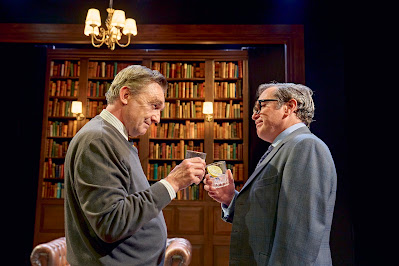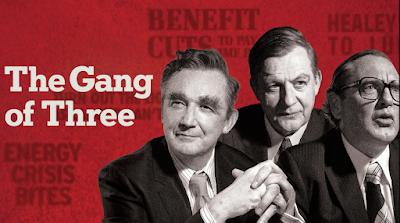 |
| Steven Maddocks and Josephine Rogers (photo Cam Harle) |
The Hope Theatre gets inside your head, it’s a box of
delights that closes in on the audience always a different shape, always a different
story and tonight’s fever dream was no different as we were lost between a dark
Edwardian cottage and the storage space deep beneath the British Museum. W. W.
Jacobs’ original story became something of a warning to the wise in a psychodrama
played out with such expert choreography by Josephine Rogers and Steven
Maddocks… not forgetting the mysterious Herbert a supernatural substitute for
love and offspring that may or may not be “real”.
The Monkey’s Paw was originally published in 1902 and became a stage play by Louis N. Parker in 1907 then, a sadly lost silent film in 1915, starring John Lawson, who also played the main character Parker’s play. Since then, there have been numerous adaptations all most thrilling and focused on the horror. This version devised, written and produced by Infinite Space Theatre and directed by Leah Townley, is focused on the more human horrors of a husband and wife living on the margins and struggling to make ends meet as the Great War looms and their economic and personal circumstances stretch their sanity and their relationship to breaking point.
 |
| Josephone Rogers, Steven Maddocks and the paw... (photo Cam Harle) |
The horror here is not so much the monkey’s paw as their
ability to establish a relationship and to improve their circumstances. They
wish for a child and they pray for professional success and economic wellbeing –
they want to be warm and comfortable – they do not want to fall into debt, and end
up in the workhouse which, at this time, was you’re only option should you not
be able to meet your financial obligations. Those good old days all the flags
and indignant pomp of modern politics evoke, of course overlooks the lack of
welfare and healthcare at this point in Great Britain when most didn’t even
have the vote.
Jenny and John White represent what could be described as the struggling lower middle and it doesn’t take much bad fortune for the former to be losing her eyesight through working on her Singer sewing machine 14 hours a day or dreading working with rabbit skins as her family had had to do when she was young, an existence so squalid that as an eight year old she just didn’t notice the dead eight-day old baby in the bed in which her twin brother was dying having inhaled just too much rabbit fur to breathe.
 |
| One stage, two worlds... |
The real horror is their lives and not the paw… this is
merely a device to show that self-improvement is only possible through
solidarity and hard graft, together with aligned purpose.
The paw is a distraction especially for John who works in the museum’s store and having found the mummy of an unidentified child, also finds the remains of the primate hidden in the folds of its bandages. Accidentally discovering that it can make his wishes come true after it magics him home, he quickly wastes his next two wishes on lamb stew and then a vague hope for happiness for his wife. The paw grants wishes but never for free, there is always a consequence and there is almost no way of wishing, for example, for money without someone or something precious being lost or wishing for life when that night only mean death warmed up…
Whilst these horrors are very well handled and key to the story, the real power is in the relationship between these two fragile but determined souls, trying to make their love last in the most challenging of circumstances.
The choreography of the two main characters, the paw and the Herbert who may or may not be a real baby, is brilliantly handled as is the use of the space to denote Jenny at home and John at work or in Egypt chasing his lost cause in the War for 18 shillings a week… My granddad was stationed in that area at 17 in 1918 and this part of the play is particularly touching bearing in mind his experience as a young lad from Widnes who would have much to contend with over the decade after his return.
Josephine Rogers and Steven Maddocks work so hard for the audience and lose themselves and us in their moments and they full deserved their applause at the end: as plays go this is like whistling and dancing at the same time whilst juggling too… well played!
IThankYouTheatre Rating: **** For a thoroughly inventive and enjoyable play that reminds us of the essential hardships of life without magic wishes as much as the perils of Egyptian magical forces!
A tip of the hat to Hannah Williams excellent stage design
as well as Alex Forey illuminations and the atmospherics of Peter Michaels
sound design. Gisela Mulindwa also made some truly unsettling props… I shall be
having nightmares – a regular thing, all started by Doctor Who and plastic
dummies when I was a child… but thanks all the same Gisela!
The Monkey's Paw plays at the Hope until 8th November and I recommend it as a scary seasonal treat and a stark reminder of the past we should never forget!
Photography all from Cam Harle
PS: National Insurance was introduced in 1912 (thanks
Lloyd George) but was far from comprehensive whilst workhouses continued in use
until the late 1920s and beyond… This “golden age” of our past, when was it
exactly?


















